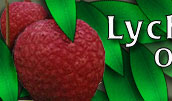Tips on Getting Your Lychee Tree to Produce Fruit
by Bill Mee and Krystal Folino
Lychee trees grow in recurrent cycles of growth followed by periods of dormancy. Typically, a South Florida lychee tree will experience 4 - 6 annual growth flushes depending on the age and size of a tree. The trick is to have the tree enter the cooler months in a state of dormancy so that the next wave of emerging buds develop into bloom spikes, providing that the temperatures are at or below 68 degrees F (20 degrees C).
Now that we have identified one reason why many lychee trees irregularly produce fruit in South Florida, we need to outline a possible solution to this problem. No amount of possible solutions can overcome a winter with daytime temperatures in the 80s and nocturnal temperatures in the 70s, but usually during most Florida winters we will experience one or more cold fronts moving in from the northwest.
The solution begins many months in advance of the flowering season, which typically runs from late December through January. The end, in this case, is flower bud formation and the means are pruning. To visualize this process you need to plot out a linear calendar timeline showing all of the weeks from July 1 though the end of January. Ideally, we want our trees to be ending a cycle of dormancy sometime between the end of December and the middle of January.
A typical cycle encompasses a period of approximately 10 weeks where the first five weeks involve a new growth flush forming and hardening off. "Hardening off" is defined as the leaves going from a delicate light green state to a tougher dark green condition. During the second 5 weeks of this cycle the leaves simply sit there and collect sunlight and do their photosynthesis thing. If you plot backwards from January 1 you will identify the end of July as the starting point of the two 10 week cycles.
| Months |
| J |
J |
J |
J |
A |
A |
A |
A |
S |
S |
S |
S |
O |
O |
O |
O |
N |
N |
N |
N |
D |
D |
D |
D |
J |
J |
J |
J |
|
Pr |
|
|
fl |
fl |
fl |
fl |
fl |
dr |
dr |
dr |
dr |
dr |
fl |
fl |
fl |
fl |
fl |
dr |
dr |
dr |
dr |
dr |
bl |
bl |
bl |
bl |
J = July, A = August, S = September, O = October, N= November, D = December, J = Jannuary
Pr = Prune, fl = flush, dr = dormant, bl = bloom
The numbers correspond to weeks
Basically, you have to synchronize your tree(s) to a known starting point so that they will be at their most susceptible point when conditions will be optimum for bloom formation around the start of the New Year. What this means is that if you prune your trees around the middle of July, just after the harvest (if you had one) they will just be beginning to flush out at the end of July to the beginning of August. This is one of the reasons why post harvest pruning tends to lead to higher crop yields.
Not to despair completely if your tree is aggressively flushing out as we speak, which means you can forget about fruit. It is possible to prune off part of the new growth thereby inducing lateral bud formation in about 10 days. If a cold front moves in within the intervening 2 weeks you may still have a chance to get flowering and maybe fruit.
By Krystal Folino and Bill Mee
by Bill Mee & Krystal Folino - Lychees Online
Are you a lychee enthusiast? Get your FREE Lychee Idea-Kit or browse hundreds of lychee recipes, photos, tips and articles on eating and growing lychees at the Lychees Online Website
http://www.lycheesonline.com
Webmasters, editors, publishers, press, growers, marketers, etc. are free to reprint this article as long as it's reprinted in its entirety and the signature line remains intact.
Please direct a courtesy copy to info@lycheesonline.com or snail mail it to:
Lychees Online
4778 Stono Links Drive
Hollywood, SC 29449
Related Articles:
Back To Lychee Info
Back To Home Page
|
|
|
Copyright © 1999-2010 Lychees Online
info@lycheesonline.com www.lycheesonline.com (954)648-6020
|

